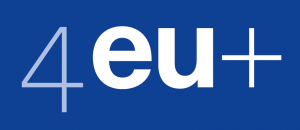On 25th September, the 4EU+ Alliance representatives, one of the largest European university partnerships, will begin their three-day meeting at the University of Warsaw. Eight member universities have been forming the European University for six years, carrying out joint courses, study programmes, research and projects. The motto of this year’s gathering is “Digital 4EU+: Education – Research – Cooperation.”
The 4EU+ Alliance Annual Meeting is an important and one of the largest events bringing together the eight European partner universities. As a rule, the presidency within the Alliance is transitional and lasts one year. During the meeting in Warsaw, the 4EU+ Alliance presidency will be handed over to Prof. Alojzy Z. Nowak, the Rector of the University of Warsaw.
The 4EU+ Alliance is one of our strategic initiatives. We are proud of our collaboration and projects with partners. Together, we are creating a European University. Plenty of students from other universities use our offer, which is proof of the high competence of our academic teachers and researchers, as well as a challenge for the future,” Prof. Alojzy Z. Nowak, the UW Rector, said.
Participation in the 4EU+ Alliance enables us, in a broad sense, to grow. The development is understood not only holistically, but also locally. Together with our partners, we create a real added value, demonstrated, among other things, in various innovations. It is certainly one of our tasks to find a way of responding to the challenges of the present day that meets the needs of a wide range of our university communities and the socio-economic environment. The aspect of using artificial intelligence is certainly notable,” added Prof. Sambor Grucza, the UW Vice-Rector for Cooperation and Human Resources.
On 25th-27th September, representatives of students, doctoral candidates, administrative staff, academics and researchers from the member universities will discuss, among other things, progress in the implementation of flagship programmes, issues related to educational projects, mobility, communications or digitalisation. They will attend a series of workshops, debates and meetings. In line with the motto of this year’s conference: “Digital 4EU+: Education – Research – Cooperation”, participants will address topics such as the application of digital solutions in education and science, including AI.
On 26th September, between 9:00 am and 4.00 pm, the following parts of the Annual Meeting, open to the broader public, will be streamed online:
- Opening of the 4EU+ Annual Meeting;
- Change of Presidency
- Opening lecture: “Academic, Critical, Practical and Public: the Four Roles of the University in the Age of Datafication”, which will be delivered by Prof. Renata Włoch from the UW’s Faculty of Sociology, the Digital Economy Lab Scientific Director;
- General Session: Digital 4EU+ in Practice.
Detailed information about the event can be found at https://4euplus2024.eu/.
About 4EU+
The 4EU+ Alliance is one of the strategic initiatives of the UW. It comprises eight European research-intensive universities:
- University of Warsaw;
- Charles University;
- Heidelberg University;
- Paris-Panthéon-Assas University;
- Sorbonne University;
- University of Copenhagen;
- University of Geneva;
- University of Milan.
The cooperation within the Alliance embraces the creation of common educational frameworks and innovative educational offers, joint research projects carried out by inter-university, multidisciplinary research teams, initiatives related to innovation, technology transfer and the social responsibility of universities.
In 2019, the Alliance was awarded European University status in the European Commission’s pilot “European Universities” call for proposals, launched as part of the Erasmus+ programme. The 4EU+ consortium was among 17 university alliances that received funding.
On 27th July 2022, the One Comprehensive Research European University (1CORE) project received funding in the next “European Universities” call for proposals. Through 1CORE, the Alliance aims to deepen the multidimensional student-centred approach, and develop new joint digital infrastructures and services, with the view of further improving the already existing governance and management framework.





